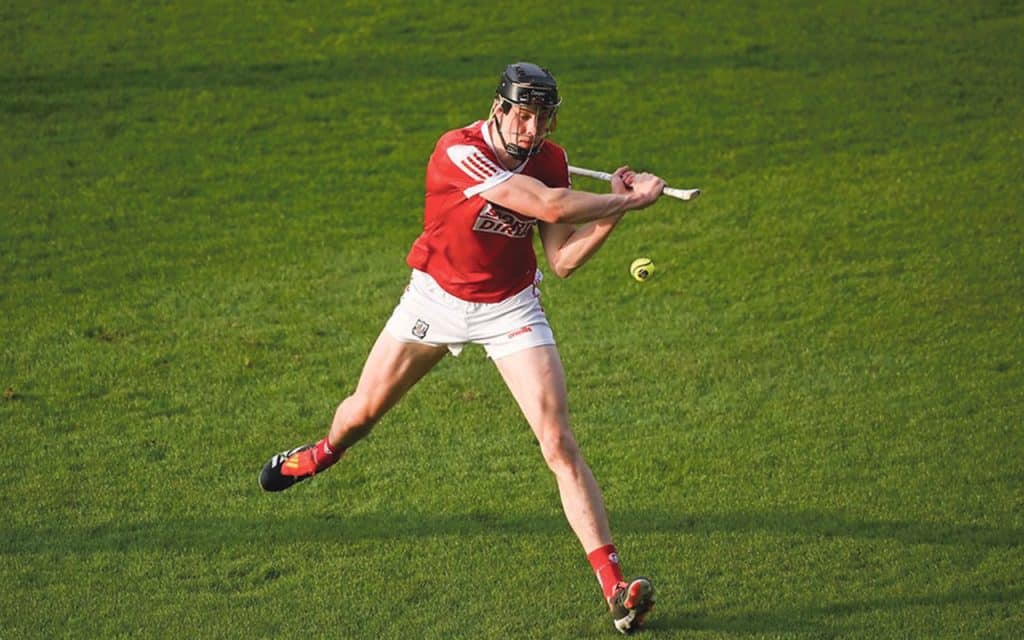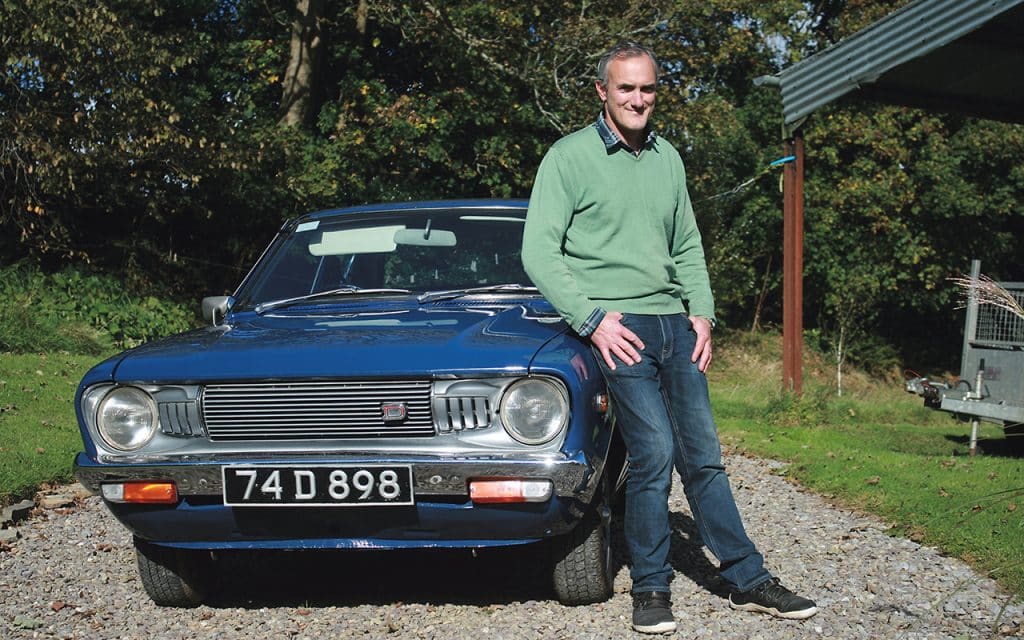The 2024 hurling season has recently concluded with Cork narrowly missing out on an All-Ireland win against Clare in July. Robert Downey played a stand-out role for Cork throughout the season, and his efforts have earned him a nomination for the GAA All-Star Awards, announced last month.
Robert has risen through the ranks to date, establishing himself as a key figure in Cork’s defensive line-up. He has won senior and minor titles with Glen Rovers, and claimed a Fitzgibbon Cup Winners medal in 2020 with University College Cork. He made his inter-county debut with the Cork minors in 2017, followed by appearances in the National Hurling League and Munster Senior Championships. He chats to Niamh Coughlan.

Robert Downey started playing hurling with Glen Rovers and football with St.Nicks when he was just four-years-old. “I can remember being very young, maybe four or five, and my dad bringing me out to the green for a puck around. My dad would tell you that I was afraid, and that I didn’t want the ball to come near me, but as I got older, I started to love it more and more”.
Robert attended Christian Brothers College for school, where he was exposed to rugby and played for a short time. However, his passion for GAA always took precedence. “Hurling was always my first love, so it was an easy decision to stop playing rugby really.” While sports were his main focus, he regrets not trying other activities. “I was never really involved in any other teams or extracurricular activities outside of sport. I sometimes regret not playing other sports, like basketball and soccer. I think basketball could have helped a lot with footwork and may have benefitted my hurling in the long run.”
Downey’s hurling career has been far from smooth. Reflecting on the challenges he’s faced, he acknowledges the knocks along the way. “We’ve lost the seven big finals I have played in. When we start winning a few, then I can say I was successful.” Despite these setbacks, achieving his childhood dream has been a success in itself; to play senior hurling for Glen Rovers and to represent Cork at the highest level.
“Teamwork is everything. I believe you can have the best 15 players in the country, but unless they are all working for each other, they won’t succeed. From what I have learned, you rely a lot more on the players around you. Each line of the pitch is reliant on the line in front of them, so it’s all about working hard for one another in order to achieve anything and be successful together.”
Before a big game with Cork, the team usually meets up the night before to eat together and relax. “Sometimes we play a few frames of snooker to take the mind off things. It’s similar with Glen Rovers. The key is to distract yourself from the match and save your energy for when you need it.”
Robert is currently working in Clearstream, a financial services company, in Cork City. He trains most days with club and county teams. “We train around five nights a week with Cork – usually four nights on the pitch, one in the gym, and one solo session. With Glen Rovers, we train three nights a week and once in the gym”.
A typical day aims to balance career with sport. “Most mornings I’m up around 7am to start work at eight. After work, I head to training. If it’s with Cork, I’ll go straight to Pairc Ui Rinn or to Pairc Ui Chaoimh. If it is with the Glen, I’ll go home first, grab something to eat, and then get ready to train.
“After training I usually do something with the lads, or call up to my girlfriend’s house.” On non-training days, he enjoys walking the dog, or playing some other sports like padel tennis, snooker or golf with friends. “Other than that, I like chilling out at home”.
The dedication to inter-county hurling and football can pose challenges to young players, especially those in university. “Many players are in universities around the country, which makes it tough to balance training and studies. “There are some players going to college in different counties and have to travel long distances for training, which impacts study time. This creates a cycle of compensating one for the other. It also makes it hard to work part-time which puts a financial burden on things”.
The GAA has made significant investments in player diet and nutrition at both club and county levels. “We are fortunate to have nutritionists with Cork and with Glen Rovers who help monitor what we eat. My diet isn’t too strict, but at my height, I need quite a lot of calories to fuel for training and matches. I focus on healthy options daily. There was a time when I had to eat 4000 calories a day for about five or six weeks to gain size, and our Cork nutritionist, Billy Murphy, was a great help with giving meal plans and supplements for that.”
Robert sees his professional and sporting goals as closely aligned. “I think they are quite similar. In hurling, I would love to be as successful as possible, and it’s no different in my career. I recently completed a master’s in Management and Marketing, and I hope to progress further in Clearstream.”
Playing any sport at such a high level can have an impact on social life. “It can be hard, especially to miss out on events like weddings, stags and nights out with friends. In my first year of college I found it tough, but I’ve grown more accustomed to it over time.” Fortunately, most of his friends also play hurling, which enables opportunities for them to socialise together.
He acknowledges the difficulty of finding time for travel or holidays due to the intense year-round training and match schedule. “Honestly, I don’t feel the urge to go travelling. I am happy to stay in Ireland and focus on playing for as long as possible. I might regret that later, but right now, my priority is hurling”.
As one of the tallest players on the pitch, Robert sees his height as both a blessing and a curse. “I think my height helps me a lot, especially for catching high balls and adding force, but it can also hinder me slightly”.
His strong mindset has been shaped by early years with Glen Rovers and at home. “It was drilled into us from the start to never give up. As cliché as it sounds, that is something I carry into every training session and match. Mindset is everything”.
Playing alongside figures like Patrick Horgan, a fellow Glen man, has greatly influenced many up and coming players in Cork. “I always looked up to Graham Callnan. He played in a similar position to me and he was incredible. He captained Glen Rovers to win back-to-back county titles in 2015 and 2016. He was named man of the match in the 2015 final against Sars. He’s a highly respected player within the club”. Another person Robert looks up to is Paddy Cunningham. “He was a warrior throughout his career with a never-say-die attitude. He always showed up and played the game very well”.
Robert considers winning the Minor County Championship with Glen Rovers as his biggest achievement. “It was the team I grew up with, and we hadn’t won a league game in two years. “Nobody expected us to win, which made it even sweeter. The seniors had lost to Na Piarsaigh the week before, and the club was in low spirits, so it was a great boost for everyone”.
His senior debut for Cork was in 2019 against Limerick at the Gaelic Grounds. Despite his typically calm demeanour on the field, Robert admits to feeling nervous before big games. “It was very nerve-wracking for me. But once the ball was thrown in, the nerves disappeared. I was able to focus on my job and help secure a win in the end”.
This year, the Cork senior team made significant progress by reaching the All-Ireland Final against the odds. Robert, and his younger brother Eoin, contributed to a game which will serve them well heading into the next season. “I think there are many things that we’ll analyse as a team in more detail for next year. This year ended disappointingly, but there are lots of positives we took from it”.
The taste for success has only heightened their eagerness to push forward next year. “Our aspirations as a team remain the same – we want to win as much silverware as possible. The team is still very young but we’re ready for it all, as we’ve shown this year.



